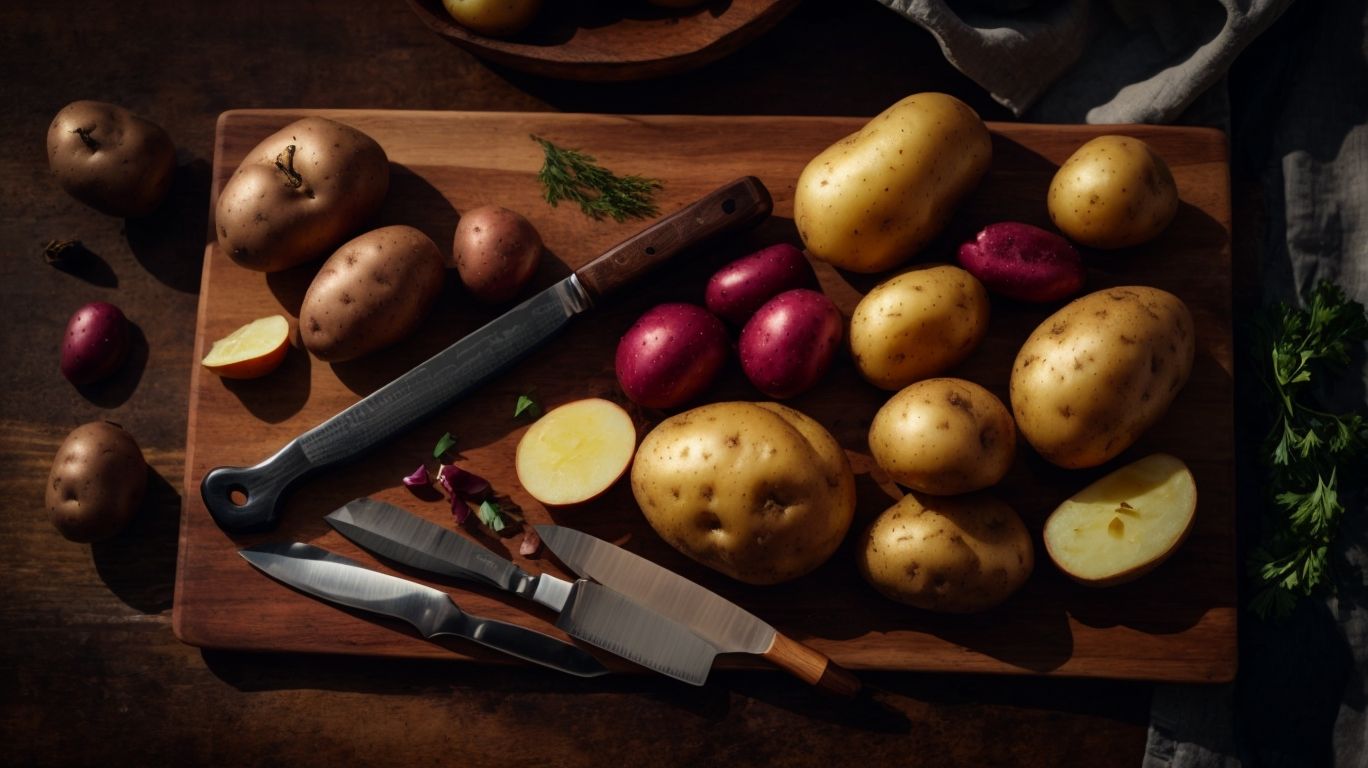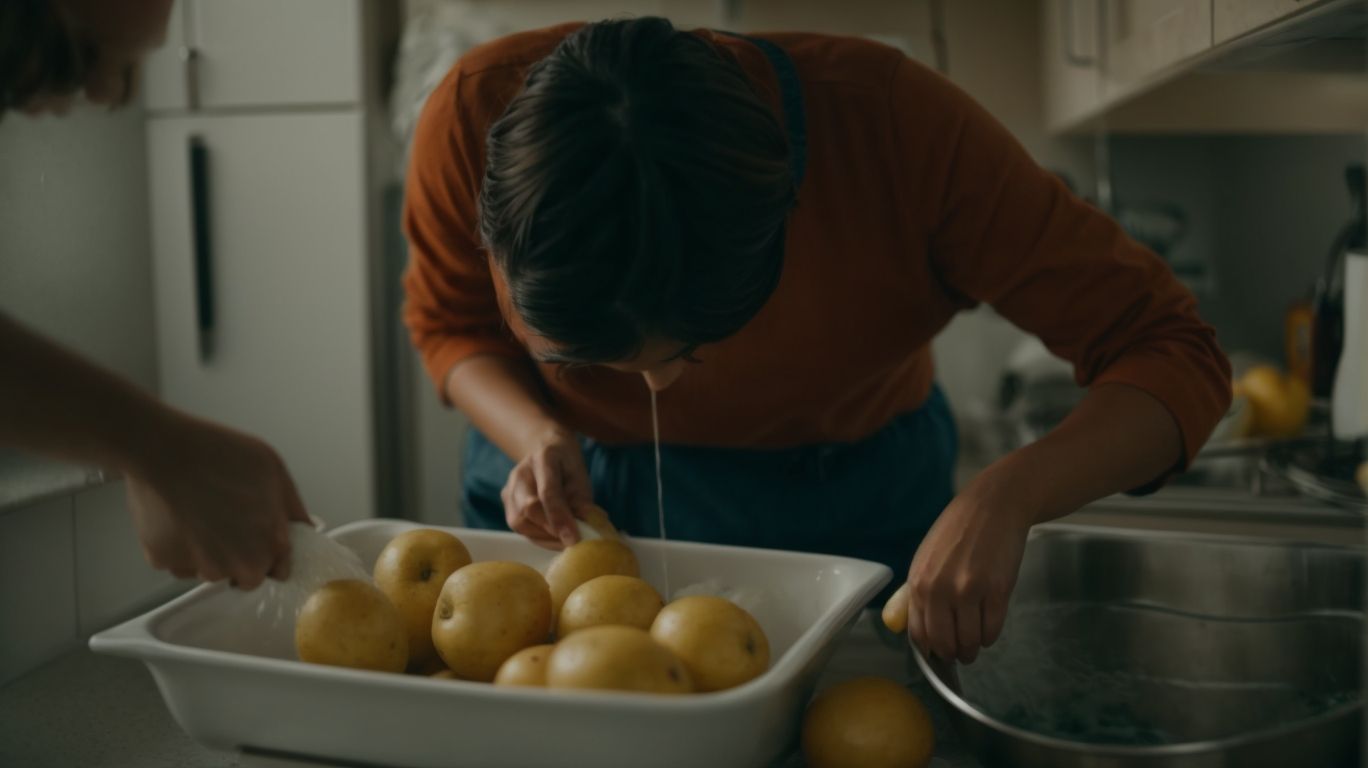How to Bake Potatoes for Baby?
Are you looking for a nutritious and easy-to-digest option for your baby’s first foods? Look no further than potatoes!
In this article, we will explore why potatoes are a great choice for baby food, how to choose the right potatoes for your little one, and tips for preparing and baking them.
From basic baked potato puree to cheesy baked potato fingers, we will also provide you with delicious recipes to try out.
Let’s learn more about the benefits of incorporating potatoes into your baby’s diet!
Key Takeaways:
What Makes Potatoes a Good Choice for Baby Food?
Potatoes are an excellent choice for baby food due to their rich nutritional value, making them a versatile ingredient for homemade purees and mashes.
Rich in vitamins and minerals such as vitamin C, potassium, and folate, potatoes help support a baby’s growth and development. Potatoes are easily digestible, making them a gentle option for young digestive systems. They provide essential carbohydrates for energy, aiding in your baby’s active daily routine. The soft texture of mashed potatoes also makes it a convenient first food for infants beginning their solid food journey. When cooked properly and unsalted, mashed potatoes can serve as a nutrient-rich, wholesome addition to a baby’s diet.
Nutritional Value
The nutritional value of potatoes for baby food is significant, offering essential vitamins, minerals, and easy digestibility for young tummies.
Potatoes are a great source of vitamin C, which is crucial for boosting the immune system and promoting healthy skin and tissue repair in babies. They contain potassium, supporting proper muscle function, nerve transmission, and overall growth and development.
The dietary fiber in potatoes aids in maintaining healthy digestion and preventing constipation in infants. Their soft texture makes them easy for babies to eat, and their mild flavor is generally well-liked by young taste buds.
Easy to Digest
Potatoes are easy to digest for babies, especially when mashed or pureed, providing a gentle introduction to solid foods.
As a root vegetable, potatoes are rich in essential nutrients such as potassium, vitamin C, and fiber, which are beneficial for a growing infant’s development. Their soft texture after being cooked makes them a safe choice for young ones who are transitioning to solid foods, reducing the risk of choking hazards. The mild flavor of potatoes complements a variety of other baby foods, making them a versatile ingredient to include in homemade purees and mashes. The high carbohydrate content in potatoes supplies infants with a good source of energy to support their active growth and development.
Versatile in Recipes
Potatoes are incredibly versatile in baby food recipes, allowing for creative combinations with various ingredients to introduce diverse flavors and textures.
For infants who are just starting solids, mashed potatoes can be a great foundational ingredient that pairs well with broccoli for added nutrients or with pureed carrots for a naturally sweet taste. You can also mix in peas or zucchini to create vibrant and nutrient-rich meals.
For older babies, you can experiment with incorporating diced potatoes into soups or stews along with chicken or beef for added protein. These versatile tubers can be baked, steamed, boiled, or roasted to cater to different textures and tastes, making them a staple in diverse baby food preparations.
How to Choose the Right Potatoes for Your Baby?

Credits: Poormet.Com – Eugene Johnson
Selecting the right potatoes for your baby’s meals is crucial, whether opting for organic varieties or considering the benefits of sweet potatoes over regular ones.
When choosing potatoes for your baby, it’s important to consider factors such as texture, taste, and nutritional content.
- Sweet potatoes are often favored for their slightly sweeter flavor, softer texture, and higher beta-carotene content compared to regular potatoes.
- On the other hand, regular potatoes provide essential nutrients like potassium and Vitamin C.
Opting for organic potatoes can further enhance the quality and safety of your baby’s food, as they are grown without synthetic pesticides or fertilizers. Before introducing potatoes into your baby’s diet, consult with your pediatrician to ensure they are developmentally ready and to address any concerns regarding allergies or digestive issues.
Organic vs Conventional
The choice between organic and conventional potatoes for baby food hinges on considerations of pesticide exposure and overall ingredient quality.
Opting for organic potatoes offers numerous advantages when it comes to preparing baby food. Organic potatoes are grown without synthetic pesticides, which reduces the risk of exposing infants to harmful chemical residues. These potatoes are also cultivated using natural fertilizers and traditional farming methods that prioritize soil health and biodiversity.
In contrast, conventional potatoes may contain pesticide residues that can pose health risks to babies. By choosing organic produce, parents can ensure that their little ones are consuming food free from potentially harmful substances. Organic ingredients are typically higher in essential nutrients, making them a healthier choice for growing bodies.
Sweet Potatoes vs Regular Potatoes
When deciding between sweet potatoes and regular potatoes for baby food, it’s essential to weigh the nutritional profiles and flavor differences of each.
One key advantage of sweet potatoes in baby food is their high levels of beta-carotene, a precursor to vitamin A, essential for vision and immune function.
In contrast, regular potatoes are higher in starch and lower in fiber compared to sweet potatoes, which can be beneficial for babies’ digestive health.
Furthermore, sweet potatoes offer a natural sweetness that appeals to many infants, while regular potatoes have a more neutral flavor, making them versatile for different flavor combinations in baby meals.
Preparing Potatoes for Baby Food

Credits: Poormet.Com – Juan Lee
Properly preparing potatoes for baby food involves steps such as washing, peeling, and selecting suitable cooking methods to ensure a safe and nutritious meal.
One of the critical aspects in preparing potatoes for babies is to ensure that they are thoroughly washed to remove any dirt or residue. This helps in eliminating potential harmful bacteria and pesticides that may be present on the skin.
After washing, peeling the potatoes is essential to remove any impurities and enhance the digestibility for the baby. When selecting cooking methods, it is important to opt for techniques such as steaming or boiling rather than frying, as these methods help retain the nutrients in the potatoes while making them soft and easy for the baby to consume.
Washing and Peeling
Thoroughly washing and peeling potatoes for baby food is crucial to eliminate dirt, pesticides, and potential contaminants, ensuring the safety of the meal.
One key aspect of washing potatoes is to use a vegetable brush to scrub off any residue on the skin, especially if the potatoes are not organic. This helps to reduce the risk of ingesting harmful chemicals. Peeling the potatoes further removes any remaining dirt or pesticides that may have penetrated the skin. Ensuring a clean preparation area and sanitized utensils are equally important before handling the potatoes to prevent cross-contamination.
Cooking Methods
Choosing the right cooking methods for potatoes in baby food, such as baking or boiling, can help retain nutrients and create palatable textures for young eaters.
When preparing baby food, baking potatoes can help maintain their natural flavors and nutrients. Baking allows potatoes to be cooked without losing much of their nutritional value. The gentle heat of the oven keeps the potatoes tender and allows them to develop a slightly crispy exterior that can be appealing to little ones.
On the other hand, boiling potatoes for baby food offers a softer texture, ideal for babies who are just starting to eat solid foods.
Boiling potatoes involves submerging them in water until they are soft and easily mashed. This method can be particularly useful for creating purees that are easy for babies to eat. The boiled potatoes can be mashed or pureed to the desired consistency, providing a smooth and creamy texture that appeals to young palates.
Ultimately, the choice between baking and boiling potatoes for baby food depends on the desired texture and flavor profile for the young eater.
Mashing or Pureeing
Mashing or pureeing potatoes for baby food provides options to create varied textures suitable for different stages of your infant’s feeding journey.
For younger babies just starting on solids, opt for a smoother texture to ensure easy swallowing and digestion. As your little one progresses, gradually introduce chunkier consistencies to help develop their chewing skills. You can experiment with adding a dash of breast milk or formula to achieve a creamier texture or incorporate other soft fruits and vegetables for more flavor. Remember to always monitor your baby’s reactions to new textures and consult with a pediatrician when in doubt about suitable food consistencies.
Recipes for Baked Potato Baby Food
Experimenting with baked potato recipes for baby food can introduce delightful flavors and textures, enriching your little one’s culinary experiences.
}
When creating baby-friendly baked potato dishes, it’s important to focus on simple, wholesome ingredients that are gentle on their developing digestive systems. Consider incorporating ingredients like avocado, sweet potato, and apple puree to add a touch of sweetness and nutrition.
For a savory twist, try mixing in cooked broccoli, carrot, and mild cheese. These additions not only enhance the flavors but also provide essential vitamins and minerals.
Basic Baked Potato Puree
Creating a basic baked potato puree for baby food is simple and nutritious, offering a wholesome meal option that appeals to young palates.
Baked potato puree is a great introduction to solid foods for infants, providing essential nutrients like potassium and Vitamin C. To prepare, start by scrubbing a potato thoroughly and baking it until soft. Once cooled, peel off the skin and mash the potato into a smooth consistency.
For added flavor and nutrients, you can mix in a splash of breast milk or formula. Avoid adding salt, sugar, or butter at this stage as babies’ taste buds are still developing. Gradually introduce new ingredients as your baby gets older.
Sweet Potato and Apple Mash
Combining sweet potatoes and apples in a mash for baby food can yield a delightful blend of flavors and complementary nutrients for your little one.
These two ingredients not only create a naturally sweet and creamy texture that babies love but also pack a nutritional punch. Sweet potatoes are rich in fiber, vitamins A and C, and beta-carotene, promoting vision health and a strong immune system. Apples, on the other hand, provide a dose of vitamin C and dietary fiber, aiding in digestion and overall gut health.
Together, they offer a balance of carbohydrates, essential vitamins, and minerals necessary for healthy growth and development in infants, making this sweet potato and apple mash a great choice for introducing new flavors and nutrients to your baby’s diet.
Cheesy Baked Potato Fingers
Cheesy baked potato fingers are a fun and nutritious snack option for babies, combining the goodness of potatoes with a cheesy twist in an easy-to-hold form.
These delicious finger foods not only provide essential nutrients but also cater to the need for textures that help in the development of your little one’s fine motor skills.
When preparing these baby-friendly snacks, opt for organic potatoes and high-quality cheese options to ensure that your baby is getting the best ingredients.
With their manageable size and soft texture, cheesy baked potato fingers are an ideal choice for introducing new flavors and fostering independent eating in infants.
Tips for Baking Potatoes for Babies
When baking potatoes for babies, it’s essential to follow specific tips to ensure optimal nutrition, texture, and safety in their meals.
Make sure to choose organic potatoes to avoid exposing your baby to pesticides and chemicals.
- Scrub the potatoes thoroughly to remove any dirt and contaminants.
- Keep the skin on to retain maximum nutrients and fiber.
Roasting the potatoes in the oven with a drizzle of olive oil can enhance their natural flavors without compromising their nutritional value.
You can mash the baked potatoes or cut them into small, manageable pieces to introduce different textures and aid in your baby’s sensory development.
Avoid Adding Salt and Seasonings
It’s crucial to avoid adding salt and seasonings when baking potatoes for babies to maintain their natural flavors and safeguard their developing taste preferences.
When introducing solid foods to infants, it’s important to gradually expose them to different tastes and textures without overwhelming their delicate palates. Excessive salt intake at an early age can lead to health issues like high blood pressure later in life. Limiting salt also allows babies to appreciate the intrinsic flavors of foods, helping them develop a preference for nutrient-dense options. Combining a variety of fresh ingredients like fruits, vegetables, and lean proteins can enhance the nutritional profile of baby meals, promoting healthy growth and development.
Use Breast Milk or Formula for Added Nutrition
Enhancing baked potato recipes for babies with breast milk or formula can offer additional nutrition and familiar flavors, catering to their growing dietary needs.
Both breast milk and infant formula are excellent sources of essential nutrients crucial for a baby’s development, including proteins, fats, vitamins, and minerals. By incorporating these into potato dishes, parents can ensure that their little ones receive a well-rounded meal that supports their overall growth and health. The creamy consistency of breast milk or formula can add a delightful texture to mashed potatoes, making them more appealing to infants transitioning to solid foods.
Introduce One Ingredient at a Time
When introducing potatoes to your baby, it’s advisable to start with one ingredient at a time to monitor their digestion, allergies, and preferences accurately.
Gradually introducing new foods to your little one is essential to identify any potential adverse reactions or sensitivities early on. Opting for single ingredient meals, such as pureed potatoes, makes it easier to pinpoint any issues that may arise. This method also helps you track how your baby responds to specific foods, facilitating a more informed approach to their diet.
Focusing on individual ingredients like potatoes allows you to gauge their impact on your infant’s digestive health. By observing how your baby processes and tolerates potatoes before introducing other ingredients, you can minimize the risk of digestive discomfort and detect any unusual reactions promptly.
Conclusion

Credits: Poormet.Com – Joseph Scott
In conclusion, potatoes offer a myriad of culinary possibilities for baby food, from simple purees to creative finger foods, enriching your child’s nutritional journey with flavorful options.
When introducing potatoes into your baby’s diet, it provides a good source of essential nutrients such as vitamin C, potassium, and fiber, which are crucial for healthy growth and development.
Pureed potatoes serve as a versatile base ingredient, easily combined with various fruits and vegetables to create a nutritious blend that appeals to your little one’s taste buds.
Diced or mashed potatoes can be integrated into more complex dishes, helping your baby explore different textures and flavors in a fun and interactive way.
Frequently Asked Questions
1. How to Bake Potatoes for Baby?
Baking potatoes for your baby is a simple and healthy option. To begin, wash and scrub the potatoes thoroughly and then bake them in the oven until they are soft and fully cooked.
2. What type of potatoes are best for baking for babies?
Russet potatoes are the best option for baking for babies. They have a soft texture and mild taste, making them easily digestible for little ones.
3. Can I add seasonings to the baked potatoes for my baby?
It is recommended to avoid adding any seasonings or spices to baked potatoes for babies under one year old. Their delicate taste buds are still developing, so it’s best to keep the seasoning simple.
4. How long should I bake the potatoes for my baby?
Depending on the size of the potatoes, they typically take about 45-60 minutes to bake in the oven at 375°F. To ensure they are fully cooked, test the potatoes with a fork. If it easily pierces through, they are ready.
5. Can I peel the potatoes before baking them for my baby?
Yes, you can peel the potatoes before baking them for your baby. However, keep in mind that the skin of the potato contains valuable nutrients. If your baby is ready for solid foods, it is recommended to leave the skin on for added nutrition.
6. How should I serve the baked potatoes to my baby?
Once the baked potatoes are fully cooked, remove them from the oven and let them cool down. Once they are cool enough to handle, you can cut them into small pieces or mash them for your baby. You can also mix in some breast milk or formula to create a smoother texture. Always make sure the potatoes are at a suitable temperature before feeding them to your baby.

